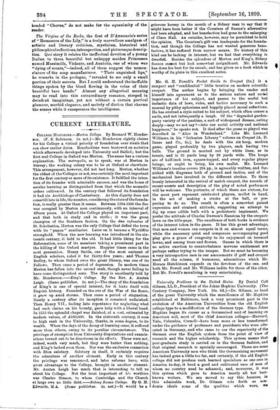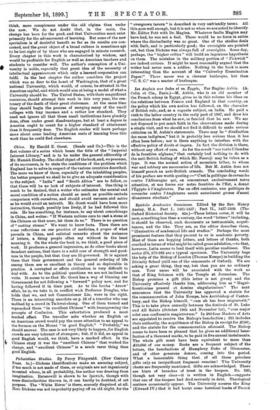University Problems in the United Stales. By Daniel Coit Gilman,
LL.D., President of the Johns Hopkins University. (The Century Company, New York. 10s. 6d.)—Dr. Gilman, as head of the great University which the munificence of Mr. Hopkins established at Baltimore, took a very prominent part in the evolution of the American Universities from the old English college type to a modification of the German type. Since Johns Hopkins began its career as a Germanised seat of learning on American soil, most of the chief American colleges—Harvard, Yale, Columbia, Cornell—have been more or less transformed under the guidance of professors and presidents who were edu- cated in Germany, and who came to see the superiority of the German over the English system from the point of view of research and the higher scholarship. This system means that post-graduate study is carried on in the German fashion, and that original research is specially encouraged. There are some American University men who think the Germanising movement has indeed gone a little too far, and certainly, if the old English college did not produce such learned specialism as one sees in America to-day, it bred a good and cultivated race of men of whom no country need be ashamed.; and, moreover, it was this system which gave to America nearly all her best- known writers. We are moved to say this because, in this admirable work, Dr. Gilman seta forth as aca- demic ideals some of the qualities which were, we
think, more conspicuous under the old regime than under the new. We do not doubt that, in the main, the change has been for the good, and that Universities must exist primarily for the advancement of learning. But some of the new specialism is of doubtful benefit so far as its results are con- cerned, and the great object of a broad culture is sometimes apt to be lost sight of by those who are engaged in minute research. Every chapter in this work is characterised by wisdom, and would be profitable for English as well as American teachers and students to consider well. The author's conception of a Uni- versity is noble, especially that great idea of the necessity of intellectual appraisement which only a learned corporation can fulfil. In the last chapter the author considers the project which was so dear to the heart of Washington, that of a great national University, which would, of course, be situated in the American capital, and which would aim at being a model of what a University should be. The United States, with their magnificent resources, should attempt this work in this very year, the cen- tenary of the death of their great statesman. At the same time they should begin the process of merging many of the small colleges with tiny incomes and a rather low standard. They need not ignore all that these small institutions have pluckily done, often under great disadvantages, but at least a degree in America ought to count for a higher standard of attainment than it frequently does. The English reader will learn perhaps more about some leading American Beata of learning from this work than he could find elsewhere.



































 Previous page
Previous page